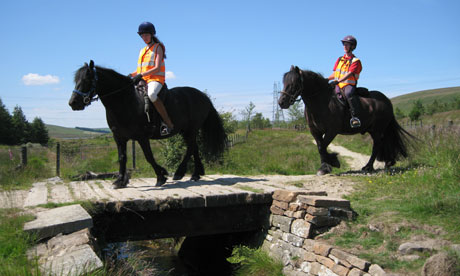
We wake to the sound of swallows. Dozens of them come to Peers Clough Farm each spring and nest under the eaves of the house and surrounding barns. They lay their eggs, feed their young and watch them fledge. The young swallows take perilous test flights across the farm yard, closely observed by the cat. In September, when their tail feathers have grown long and pointed, the swallows set off for the long journey south for the winter.
On a brilliant summer day, winter seems a long way off. My daughter Ros and I are at Peers Clough for a riding mini-break in the Rossendale Valley, on the borders of Lancashire and West Yorkshire. Ros, who is just about to celebrate her 21st birthday, spends most of her time in London and I, too, live and work in a city. The weekend will, we hope, reconnect us with the natural world, show us a part of Britain that is not an obvious tourist destination, and give us some fun time together.
Peers Clough, a 200-year-old former dairy farm, is a family enterprise specialising in trail rides for small groups. Chris Thomas and her daughters, Cia and Suzy, are passionate about fell ponies, one of Britain's native mountain and moorland breeds. Developed over centuries to cope with the rugged terrain of northern England, fell ponies were used as packhorses to carry heavy loads over the hills, and for ploughing and shepherding. Today the fell pony is an endangered breed.
Our two half-day rides will take us up on to the open moorland above the farm. Peers Clough is surrounded by bridleways, and lies directly on the Mary Towneley Loop, part of Britain's first long-distance bridleway. This 76km circular route is named in memory of Lady Mary Towneley, the long-distance rider who campaigned to re-establish the historic trackways that used to connect hamlets, towns and villages.
Fell ponies are the black labradors of the pony world – friendly, dependable and very, very greedy. They are built for stamina and sure-footedness, not speed, and their thick coats are designed to protect them from wind and rain. To meet the standards of the breed, they can't be more than 14 hands high.
When we are introduced to Jimmy and Jake, the ponies we will ride for the weekend, Ros and I worry that our legs will be dangling – we're both tall. But what Jimmy and Jake lack in height they make up for in width, and we don't look as silly as we feared.
Setting off, we take a narrow path out of the yard and head up through meadows of clover and buttercups. Up on the hill we get the chance to canter along some springy turf tracks. The ponies bound along, their short strides strong and bouncy. When we stop for a breather Ros gives Jake an affectionate pat; she has a huge grin on her face. Looking north we can see the Yorkshire Dales with the peaks of Ingleborough and Pen-y-Ghent; looking south we can see the profile of Pendle Hill, famous for the witchcraft trials of 1612.
There is a raw beauty to this valley, with its stone walls and solid villages. Chris explains that this was a poor region that saw a short spell of prosperity during the early stages of the industrial revolution, when mills and factories were built alongside the fast-flowing rivers. Communities like Lumb and Water sprang up to house the burgeoning workforce: to our southern eyes the rows of terraces, with their back yards abutting steep fields and tumbling brooks, resemble slices of Lowry-like inner city dropped into the countryside.
Ros and I feel totally secure on our ponies, who are expert at navigating the steepest slopes and happy to be tied up to a hawthorn bush while we eat our packed lunches. Chris is the most unbossy guide – not once are we told to keep our heels down or sit up straight. She is a qualified ride leader but, in her own words, "definitely not a riding instructor". Each summer she accompanies small groups on a four- or five-day rides around the Mary Towneley Loop with overnight stops at farmhouse B&Bs. I plan to come back with a friend to do the whole route. The ride will take us over windswept moors and up and down precipitous slopes, reaching 400m at Stoodley Pike Monument, built above Todmorden to mark the defeat of Napoleon.
Horsey women have a bit of a scary reputation, but Chris has a kind of joy about her, and an ease with her surroundings that reminds me of the swallows. "I can't think of anyone it would be nicer to ride with," says Ros, as we head down the farm lane to start our drive back down the motorway.
• Peers Clough Farm (01706 210552, peerscloughfarm.co.uk) offers B&B from £27pp. For a riding mini-break, see Peers Clough Packhorses peerscloughpackhorses.co.uk, which runs guided rides from March to November for groups (minimum age 13 for trail-riding), at £130pp per night, based on twin accommodation, and including all meals and riding activities. For more on fell ponies, see fellponysociety.org, and for more on the Mary Towneley Loop, see tinyurl/MaryTLoop

